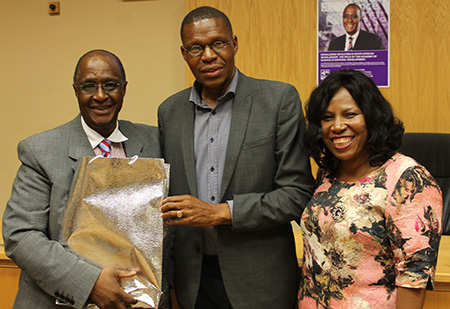On 16 April 2018 the North-West University’s (NWU’s) deputy vice-chancellor for research and innovation, Prof Refilwe Phaswana-Mafuya, invited members of the public and media to the fourth public lecture within the NWU Research and Innovation Seminar Series.
“The NWU is a great institution with remarkable scientists, and this lecture would be beneficial for all academics at the university,” said Prof Refilwe Phaswana-Mafuya.
The lecture titled “Excellence or Elitism: The Role of ASSAf in national development” was delivered by the vice-president of the Academy of Science in South Africa (ASSAf), Prof Barney Pityana. He unpacked the role of ASSAf and what it means for scholarship to be considered as excellence or elitist.
Prof Pityana stated that the main objective of ASSAf is to honour distinguished scholars in all fields of scientific enquiry and to generate evidence-based solutions to national and global challenges.
He encouraged academics to become members of the academy, as it would prove to be beneficial, not only to them but to the national development of the country.
ASSAf members enjoy various benefits. Not only are their work profiled nationally and internationally, but they also have the potential to enhance policy relevance with their research and the opportunity to serve society.
He explained that excellence refers to scholarship whose outcomes are acknowledged as providing society with excellent solutions, groundbreaking knowledge, as well as novel and smart ideas that are innovative and creative.
“However, scholarship can be considered elitist if it serves no other purpose but an intellectual indulgence of the scholar, has no tangible practical application or value, and only serves to satisfy arrogance, or partial or ideological interests,” said Prof Pityana.
He emphasised that academics should strive for excellence and their research should have a positive impact on the community.

From left are Prof Barney Pityana, vice-president of ASSAf, Prof Dan Kgwadi, NWU vice-chancellor, and Prof Refilwe Phaswana-Mafuya, the NWU’s deputy vice-chancellor for research and innovation.
